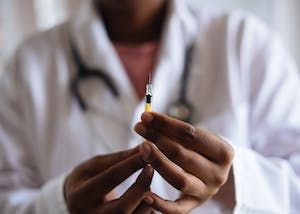Article
Adverse Skin Reactions Rare Following COVID-19 Vaccination
Author(s):
Investigators from found that 12.12% of patients with a previous skin disease diagnosis developed an adverse skin reaction following a COVID-19 vaccine injection.

New research shows adverse skin reactions are rare and generally mild following a COVID-19 vaccination.
A team, led by Yuan Li, Department of Dermatology, the First Affiliated Hospital of Nanjing Medical University, identified and analyzed adverse skin reactions following COVID-19 vaccination in a dermatology outpatient clinic in China.
The Patients and Vaccines
In the study, the investigators identified 132 cases of adverse skin reactions following a COVID-19 vaccination dose between January 2021 and January 2022. The patient population included 71 female patients and 61 males aged between 16-75 years.
The vaccines included in the analysis were Sinopharm, Sinovac and Zifivax. Both Sinopharm and Sinovac vaccines were inactivated, while Zifivax is a recombinant novel COVID-19 vaccine.
The investigators also recorded demographic information for all patients, including age, sex, presence of comorbidities, personal and family history of allergic diseases such as asthma and atopic dermatitis, COVID-19 vaccine type, and post-vaccination adverse reactions.
Adverse Skin Reactions
Overall, investigators found the first dose represented 52% of the total adverse skin reactions, while the second dose represented 40% of the total and the third dose represented 8% of the total adverse skin reactions. In addition, 54 patients had elevated eosinophil counts and IgE, while 11 patients had elevated leukocyte and lymphocyte counts in their blood.
Urticaria-like rashes were the most common adverse skin reactions at 40.15% of the total reactions, followed by eczema-like rashes at 27.27%.
For patients with a previous skin disease diagnosis, the rate of adverse skin reactions following vaccination was 12.12%.
Some other rare adverse skin reactions identified included herpes zoster, pityriasis rosea, erythema multiforme, chickenpox, herpes simplex, psoriasis, erythrodermatitis, arthus reaction, lichen planus recurrence, measles-like rashes, frostbite rash, seborrhea, and vitiligo.
The team also identified 23 cases of adverse skin reactions in the same individual following 2 doses of a COVID-19 vaccine and 3 cases in the same individual following 3 doses of the vaccine.
However, the majority of reactions required only mild treatment measures, including oral antihistamines, compounded glycopyrrolate, and topical weak to moderately potent corticosteroid creams. In addition, the total duration of adverse reactions ranged from 2 weeks to 1 month.
The investigators also identified some demographic trends.
For example, adverse cutaneous reactions following injections were more slightly more prevalent in women than in men. However, the difference was not statistically significant.
There were also more adverse cutaneous reactions due to inactivated COVID-19 vaccines than there were of the recombinant novel coronavirus protein vaccine. However, the results on recombinant novel coronavirus protein vaccine are limited due to the short duration.
While there was no statistical differences between the brands of COVID-19 vaccines, the rate of skin adverse reactions of Zifivax was higher than of the inactivated vaccines.
“Due to the relatively short period that the COVID-19 vaccine has been in use, there have been fewer reports of adverse skin reactions following the COVID-19 vaccination in our country,” the authors wrote. “It is essential to recognize that these skin reactions, when followed by awareness, can alleviate patients' concerns about adverse reactions to COVID-19 vaccination and thus actively complete the vaccination.”





